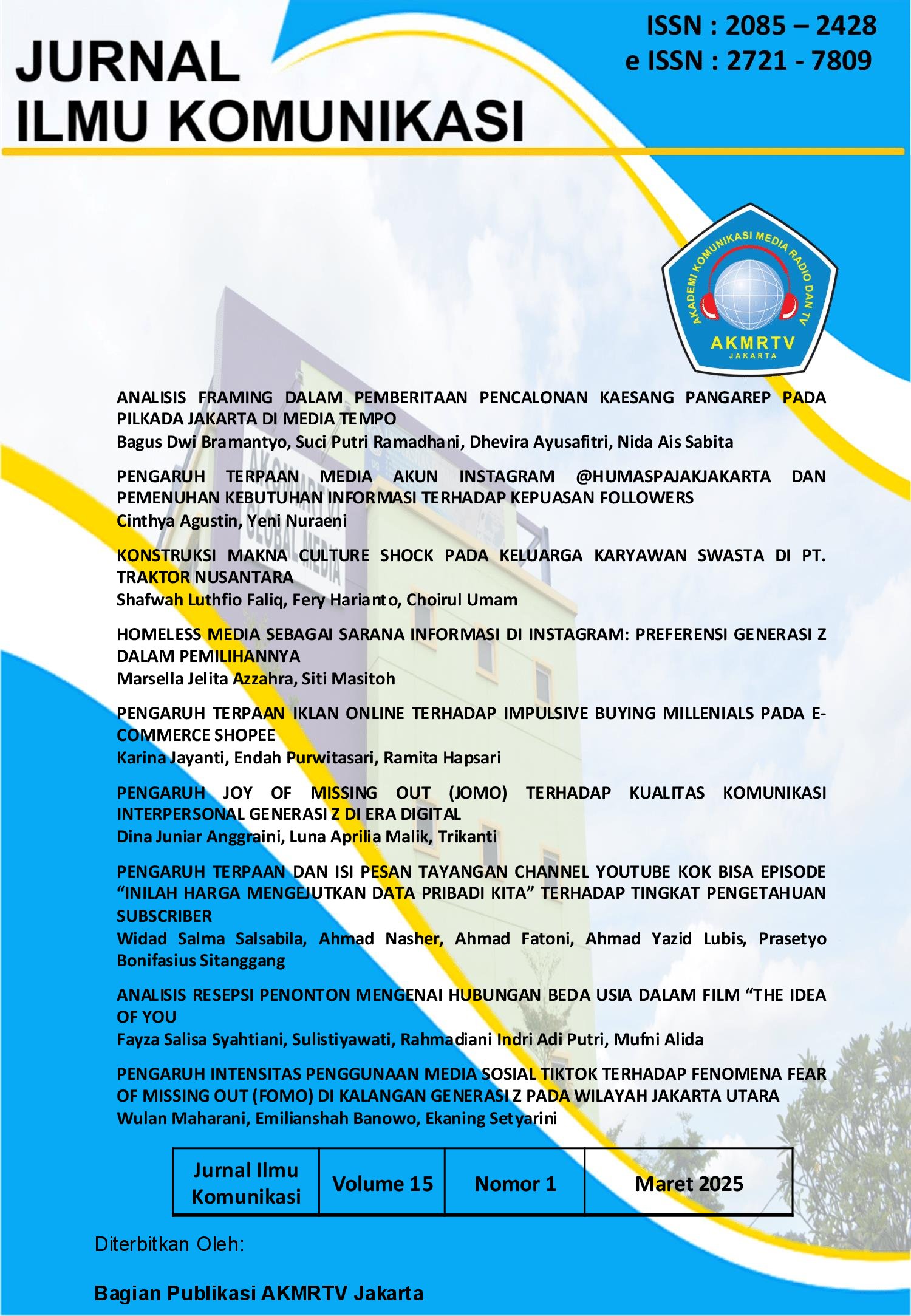PENGARUH JOY OF MISSING OUT (JOMO) TERHADAP KUALITAS KOMUNIKASI INTERPERSONAL GENERASI Z DI ERA DIGITAL
Keywords:
: Joy of Missing Out (JOMO), Generation Z, Interpersonal Communication Quality, Digital Era, Fear of Missing Out (FOMO)Abstract
This study aims to analyze the effect of Joy of Missing Out (JOMO) on the quality of interpersonal communication of Generation Z in the digital era. The concept of JOMO serves as an alternative to counteract Fear of Missing Out (FOMO) by encouraging mindfulness, balance, and intentional disconnection from digital activities to enhance personal and relational well-being. The research employed a quantitative method, with data collected through an online questionnaire distributed to 100 Generation Z respondents in the Tangerang Regency. The independent variable in this study is JOMO, represented by indicators such as the intensity of JOMO and selectivity in digital activities. The dependent variable is the quality of interpersonal communication, which encompasses indicators of empathy, communication depth, and emotional connection. Data analysis included validity and reliability tests, classical assumption tests, simple linear regression, and hypothesis testing. The results show a significant positive impact of JOMO on the quality of interpersonal communication among Generation Z in the digital era. These findings demonstrate that the practice of JOMO not only enhances individual mental well-being but also strengthens interpersonal relationships by fostering meaningful and deep connections. This research offers practical recommendations for Generation Z to cultivate healthier relationships amidst rapid digitalization. Moreover, it provides a theoretical contribution to understanding the balance between digital use and interpersonal communication in the digital era. Future studies are encouraged to explore diverse variables and adopt mixed-methods approaches to deepen insights into this contemporary issue.
References
Anggraini, C., Ritonga, D. H., Kristina, L., Syam, M., & Kustiawan, W. (2022). Komunikasi interpersonal. Jurnal Multidisiplin Dehasen (MUDE), 1(3), 337-342.
Anum, Aisah. (2022). Hubungan Antara Fear Of Missing Out (Fomo) Dengan Kesejahteraan Psikologis Pada Mahasiswapengguna Media Sosial Di Uin Ar-Raniry Banda Aceh. Skripsi: Prodi Psikologi Universitas Islam Negeri Ar-raniry.
Aranda, J. H., & Baig, S. (2018). Toward "JOMO": The joy of missing out and the freedom of disconnecting. In Proceedings of the 20th international conference on human-computer interaction with mobile devices and services (pp. 1-8).
Aurel, J. G., & Paramita, S. (2021). FoMO and JoMO phenomenon of active millennial Instagram users at 2020 in Jakarta. In International Conference on Economics, Business, Social, and Humanities (ICEBSH 2021) (pp. 722-729). Atlantis Press.
Barry, C. T., Smith, E. E., Murphy, M. B., Halter, B. M., & Briggs, J. (2023). JOMO: Joy of missing out and its association with social media use, self-perception, and mental health. Telematics and Informatics Reports, 10, 100054.
Brinkmann, S. (2019). The joy of missing out: The art of self-restraint in an age of excess. John Wiley & Sons.
Chan, S. S., Van Solt, M., Cruz, R. E., Philp, M., Bahl, S., Serin, N., ... & Canbulut, M. (2022). Social media and mindfulness: From the fear of missing out (FOMO) to the joy of missing out (JOMO). Journal of Consumer Affairs, 56(3), 1312-1331.
Crook, C. (2014). The joy of missing out: Finding balance in a wired world. New Society Publishers.
Dalton, T. (2019). The joy of missing out: Live more by doing less. Thomas Nelson.
Deci, E. L., & Ryan, R. M. (Eds.). (2004). Handbook of self-determination research. University Rochester Press.
DeVito, J. A., & DeVito, J. (2019). The interpersonal communication book. Instructor, 1(18), 521-532.
Firamadhina, F. I. R., & Krisnani, H. (2020). Perilaku generasi Z terhadap penggunaan media sosial TikTok: TikTok sebagai media edukasi dan aktivisme. Share: Social Work Journal, 10(2), 199-208.
Gonzales, A. L., & Hancock, J. T. (2011). Mirror, mirror on my Facebook wall: Effects of exposure to Facebook on self-esteem. Cyberpsychology, behavior, and social networking, 14(1-2), 79-83.
Hafizh, A. M., Hidayat, F., & Suansyah, A. (2024). FOMO Vs JOMO: Understanding the psychology behind social media consumption behavior and its impact on mental well-being with a communication psychology approach. World Journal of Islamic Learning and Teaching, 1(2), 10-18.
Newport, C. (2019). Digital minimalism: Choosing a focused life in a noisy world. Penguin.
Przybylski, A. K., Murayama, K., DeHaan, C. R., & Gladwell, V. (2013). Fear of missing out scale. Computers in human behavior.
Roberts, J. A., & David, M. E. (2020). The social media party: Fear of missing out (FoMO), social media intensity, connection, and well-being. International Journal of Human–Computer Interaction, 36(4), 386-392.
Turkle, S. (2015). Stop googling. Let’s talk. The New York Times, 27.

Downloads
Published
Issue
Section
License
Copyright (c) 2025 Dina Juniar Anggraini, Luna Aprilia Malik, Trikanti

This work is licensed under a Creative Commons Attribution-ShareAlike 4.0 International License.

















